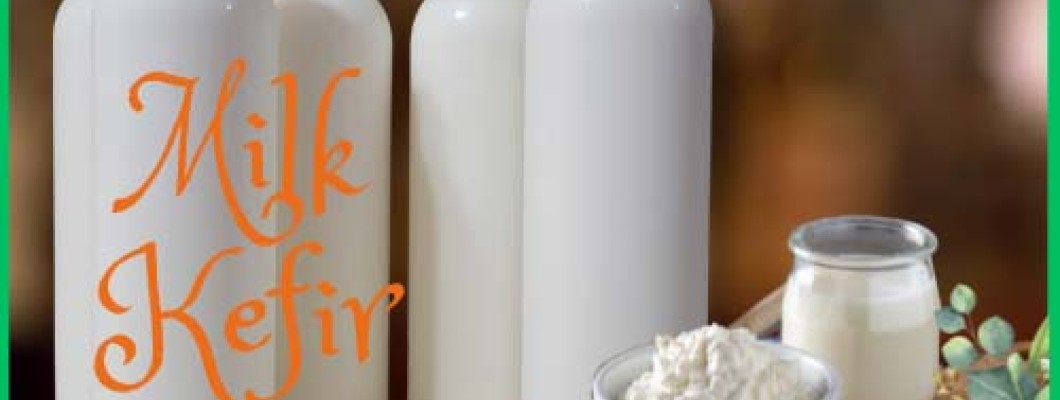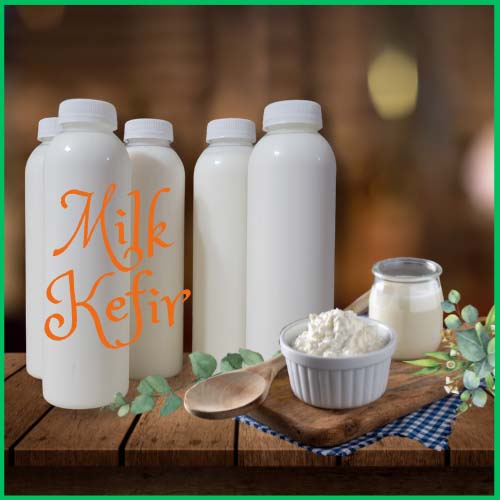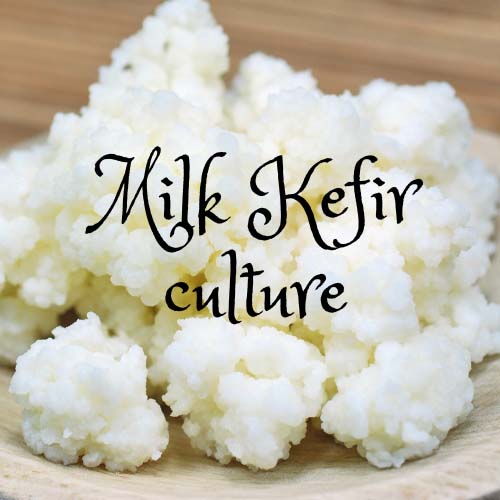
Both kefir and yogurt have many health benefits due to the good bacteria they contain.
This article will explain some of the health benefits of kefir to help you know if it is a better option for you.
Kefir (pronounced kee-fir) is fermented milk produced from kefir grains that contain bacteria and yeast. Kefir grains are whitish, irregularly shaped clusters of lactic acid bacteria and yeast, bound together in a polysaccharide matrix that closely resembles cauliflower florets.
Kefir is usually made with cow's milk, but it can also be made with goat, sheep, or buffalo milk. Vegetable milk is not recommended due to its lack of lactose, which is the main food of kefir.
Local tribes from the North Caucasus mountains of Russia were among the first to find kefir grains. They were generally considered extremely valuable and were passed down from generation to generation among the tribes of the Caucasus as family wealth.
This dairy drink has its origins in the Balkans in Eastern Europe and the Caucasus Mountains in Russia. It is a popular drink in Eastern European countries known for its therapeutic effects. The word "kefir" is derived from the Slavic word "keif" which means "well-being" or "living well."
Traditional Caucasian tribes used animal skins to transport milk from their sheep and camels. The fresh milk of these animals became a naturally available food source for the microorganisms on the animals' skin, leading to the formation of a colony containing bacteria and yeast.
Extensive research is being done on fermented foods and their beneficial effects on the human microbiome. One of the possible applications is to improve intestinal health through probiotic foods. Kefir has gained a lot of attention in recent times for its numerous health benefits, such as improved digestion, antibacterial effects, and antioxidant activity, among other benefits.

.jpg)

What is the difference between kefir and yogurt?
Although kefir is similar to yogurt in that both are fermented products that have a sour fermented taste, they are essentially different. Kefir and yogurt contain the lactobacillus bacteria that are responsible for digesting the lactose in milk and converting it to lactic acid, but in addition to bacteria, kefir also contains yeast that produces carbon dioxide and ethanol.
In some cases, the lactose content in kefir is also lower after it’s fermented as compared to yogurt. This strictly depends on the duration of fermentation, since in both cases, the longer it’s left to ferment, the lesser the lactose content.
Usually, in yogurt, the increasing levels of lactic acid may make it more acidic, which inhibits bacterial activity and lowers the rate of fermentation. When it comes to kefir, the yeast and its by-products reduce the acidity caused by lactic acid, thus increasing the fermenting activity of the bacteria. These bacteria in turn create a more suitable environment for the yeast, thus forming a symbiosis between the two organisms known to some as a symbiotic colony of bacteria and yeasts (SCOBY).
Another major difference between the two fermented products is that kefir contains a larger variety of microorganisms. Fermentation of yogurt typically occurs due to the action of two bacterial strains – Lactobacillus bulgaricus and Streptococcus thermophilus.
Kefir, on the other hand, has been found to have hundreds of different bacteria and yeasts that include strains and subspecies of lactobacilli, streptococci, acetobacter, and saccharomyces. Researchers have used procedures such as electron microscopy and genome sequencing to identify the different types of bacteria and yeast strains in kefir.
The health benefits of such fermented foods depend on the bacterial and yeast strains. This is what scientists have attributed the extensive health benefits of kefir to, as each colony of kefir grains contains a distinct microbial group that depends on the type of milk that it’s used to ferment. Another relevant factor is the microbial environment in which fermentation occurs.
Every preparation of kefir is unique due to these factors. The variety of microorganisms in kefir comes with many health benefits. These include improving the digestion of food, aiding the production of important micronutrients in your body such as vitamins B12 and K, and curbing the growth of harmful microorganisms in food and the digestive tract.
There are also some other potential benefits of kefir, such as enhanced immune function and anticarcinogenic effects. However, more research is needed to understand and identify the specific processes to which these benefits could be attributed.
Is kefir healthier than yogurt?
Although both kefir and yogurt come with several health benefits due to the good bacteria they contain, kefir is widely considered a better option since it has a larger variety of healthy microorganisms. Kefir is also a better choice for those who are lactose intolerant.
Your choice also depends on the products that are available near you, though, and your taste preferences. Both kefir and yogurt are primarily derived from dairy products, but non-dairy alternatives of both may be easily available. Compare the nutrition labels on the products to know which is the healthier option. Choosing a product without added sugar or coloring agents is a good way to go.
KEFIR BENEFITS
1. Kefir is a fantastic source of many nutrients
Kefir originated from parts of Eastern Europe and Southwest Asia. Its name comes from the Turkish word “keyif,” which refers to feeling good after eating
This is a fermented drink, traditionally made with cow’s milk or goat’s milk.
It is made by adding kefir grains to the milk. These are not cereal grains, but grain-like colonies of yeast and lactic acid bacteria that resemble a cauliflower in appearance.
Over approximately 24 hours, the microorganisms in the kefir grains multiply and ferment the sugars in the milk, turning it into kefir. Then, the grains are removed from the liquid and can be used again.
In other words, kefir is the drink, but kefir grains are the starter culture that is used to produce the beverage.
The grains’ lactic acid bacteria turn the milk’s lactose into lactic acid. This is what makes kefir taste sour like yogurt but it has a thinner consistency
A 1-cup serving of low-fat kefir contains:
• Protein: 9 grams • Calcium: 24% of the daily value (DV)• Phosphorus: 20% of the DV• Vitamin B12: 29% of the DV
• Riboflavin (B2): 25% of the DV• Magnesium: 7% of the DV• Vitamin D: 12% of the DV
In addition, kefir has about 104 calories, 11.6 grams of carbs, and 2–3 grams of fat, depending on the type of milk used.
Kefir also contains a wide variety of bioactive compounds, including organic acids and peptides that contribute to its health benefits.
Dairy-free versions of kefir can be made with coconut water, coconut milk, or other sweet liquids. These will not have the same nutrient profile as dairy-based kefir.
SUMMARY: Kefir is a fermented milk drink, cultured from kefir grains. It is a rich source of calcium, protein, and B vitamins.
2. Kefir is a more powerful probiotic than yogurt: Some microorganisms can have beneficial effects on health when ingested. Known as probiotics, these microorganisms may influence health in numerous ways, aiding digestion, weight management, and mental health. Yogurt is the best-known probiotic food in the Western diet, but kefir is a much more potent source. Kefir grains contain up to 61 strains of bacteria and yeasts, making them a very rich and diverse probiotic source, though this diversity may vary. Other fermented dairy products are made from far fewer strains and don’t contain any yeasts.
SUMMARY: Kefir may contain up to 61 different microorganisms, making it a much more potent source of probiotics than many other fermented dairy products.
3. Kefir has potent antibacterial properties: Certain probiotics in kefir are believed to protect against infections. This includes the probiotic Lactobacillus kefir, which is unique to kefir. Studies demonstrate that this probiotic can inhibit the growth of various harmful bacteria, including Salmonella, Helicobacter pylori, and E. coli. Kefiran, a type of carbohydrate present in kefir, also has antibacterial properties.
SUMMARY: Kefir contains the probiotic Lactobacillus kefir and the carbohydrate kefiran, both of which protect against harmful bacteria.
4. Kefir can improve bone health and lower the risk of osteoporosis: Osteoporosis is characterized by the deterioration of bone tissue and is a major concern in Western countries. It is especially common among older women and dramatically raises the risk of fractures. Ensuring an adequate calcium intake is one of the most effective ways to improve bone health and slow the progression of osteoporosis. Full-fat kefir is not only a great source of calcium but also vitamin K — which plays a central role in calcium metabolism. Supplementing with K2 has been shown to reduce your risk of fractures by as much as 81%. Recent animal studies associate kefir with increased calcium absorption in bone cells. This leads to improved bone density, which should help prevent fractures.
SUMMARY: Kefir made from dairy is an excellent source of calcium, and full-fat dairy kefir also contains vitamin K2. These nutrients have major benefits for bone health.
5. Kefir may be protective against cancer
Some studies have suggested chemopreventive effects of kefir, a fermented milk product, on carcinogenesis. This review study aimed to evaluate the scientific evidence for the effects of kefir on cancer prevention and treatment. We systematically searched for all relevant studies published before June 2015, using PubMed, Google Scholar, Cochrane, and Science Direct, SID, MedLib, and Srlst databases. Relevant studies were reviewed based on systematic review (PRISMA) guidelines. From a total of 2208 papers obtained at the initial database search, 11 publications including 7 in vitro and 4 experimental studies were eligible. In vitro studies on breast, colon, skin, and gastric cancers and leukemia cell lines and experimental studies on different sarcomas consistently showed beneficial effects of kefir on cancer prevention and treatment. The results of this systematic review suggest that kefir may be associated with cancer prevention and it also has beneficial effects in cancer treatment. This protection may be associated with kefir bioactive components including peptides, polysaccharides, and sphingolipids. https://pubmed.ncbi.nlm.nih.gov/26621019/
SUMMARY: Some test-tube and animal studies indicate that kefir can inhibit cancer cell growth. However, no current studies have included people, so more research is needed.
6.Kefir’s probiotics may help with various digestive concerns: Probiotics such as kefir can help restore the balance of friendly bacteria in your gut. This is why they are highly effective at treating many forms of diarrhea. What’s more, ample evidence suggests that probiotics and probiotic foods can alleviate many digestive concerns. These include irritable bowel syndrome, ulcers caused by H. pylori infection, and many others. For this reason, kefir may be useful if you have trouble with digestion.
SUMMARY: Probiotics like kefir can treat several forms of diarrhea. They can also lead to improvements in various digestive conditions.
7. Kefir is low in lactose: Regular dairy foods contain a natural sugar called lactose. Many people, especially adults, are unable to break down and digest lactose properly. This condition is called lactose intolerance. The lactic acid bacteria in fermented dairy foods — like kefir and yogurt — turn lactose into lactic acid, so these foods are much lower in lactose than milk. They also contain enzymes that can help break down the lactose even further. That’s why kefir is generally well tolerated by people with lactose intolerance, at least compared with regular milk. Keep in mind that it is possible to make kefir that is 100% lactose-free by using coconut water, fruit juice, or another non-dairy beverage.
SUMMARY: Kefir is low in lactose because its lactic acid bacteria have already pre-digested the lactose. People who have lactose intolerance can often drink kefir without problems.
8. Kefir may improve allergy and asthma symptoms: Allergic reactions are caused by inflammatory responses against certain foods or substances. People with an oversensitive immune system are more prone to allergies, which can provoke conditions like asthma. In animal studies, kefir has been shown to suppress inflammatory responses related to allergies and asthma. Human studies are needed to better explore these effects.
SUMMARY: Limited evidence from animal studies suggests that drinking kefir may reduce allergic reactions.
